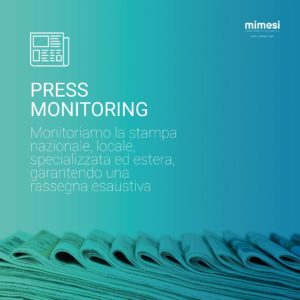Il nostro AD Marina Bonomi, intervistata da Sophia Karakeva, vice presidente di FIBEP (associazione internazionale degli operatori di media monitoring) e Communication & Marketing Executive del nostro partner greco DataScouting. Un interessante scambio di opinioni tra player internazionali.
Trovate qui l’articolo originaleCoronavirus: Stay in contact with your customers, think “out of the box” and adapt to the new reality
An interview with Marina Bonomi, CEO and Shareholder of Mimesi
Earlier this month, the World Health Organization declared coronavirus as a pandemic. The number of cases of COVID-19 is stil increasing and the entire globe seems to have stopped with simple questions, such as: What do we do now? And how do we stay safe? COVID-19 has affected almost every industry around the world. Media Intelligence is important more than ever, but facing nowadays a new reality: remote working and digital transformation. Italy has been one of the countries that has been hurt the most in Europe by COVID-19, with the most shocking data on casualties since World War II. In this interview by DataScouting with Marina Bonomi, the CEO and Shareholder of Mimesi, a media monitoring and media intelligence company in Italy, we are discussing the imapct of coronavirus and how fast they managed to adjust, the challenges they faced in order to remain operational, and how they managed to balance staff security and sanity. Marina also shares her thoughts on how the coronavirus will impact the media intelligence industry in Italy but also worldwide. And last but not least, Marina shares a message with MMOs.Q: How did you communicate with your employees, clients and partners about the coronavirus?
MB: Within the company, we divulged the indications given by the Italian government in the first days of the appearance of the coronavirus in the red area of Codogno. Most importantly, anyone who had come in contact with people from Codogno was to inform us and consequently quarantined and work from home. In further compliance with the indications, we avoided external and internal events and limited travel and transfers in full measure. We reassured customers of our utmost commitment in terms of guaranteeing continuity of service and contacted them personally via newsletter. We also communicated our availability and continuity on our proprietary digital channels and by setting a notice at the entrance of our digital platform.
Q: The transition from a workplace to home-based office usually takes time. How fast where you able you adjust to the new norm?
MB: We weren’t organized to work from home. Mimesi has three operational bases on the Italian territory, one in Milan, Lombardy and the remaining two in Parma and Forlì, in Emilia Romagna – all areas severely affected since the earliest stages of the pandemic. As soon as we understood that there would be restrictions on work and travel we urgently set to work to organize smart working for the entire company, with no exclusions. Converting all operational activities into smart working was no simple feat. These activities concern the daily monitoring of almost 2000 press and as many web sources, plus dozens of television stations, requiring the use of sophisticated software, dedicated hardware, PCs, television antennas, connections. First, we surveyed 60 of our employees to understand the quality of their home connection equipment; this way we were able to integrate the lack or insufficiency of hardware and connections by providing it where necessary within a few days. We equipped all devices with with software for remote work. At times we had to move hardware from offices to personal residences, where this would have been specific equipment and not easily replaceable. Practically in record time, within a single week, we were able to turn every one to smart working.
Q: What kind of obstacles, restrictions and/or challenges did you face in order to remain operationally sustainable?
MB: Despite Lombardy and Emilia-Romagna being the first and most heavily impacted areas in Italy, luckily they have excellent internet connection and networks and are logistically very well-organized. To avoid unforeseen complications that could arise from changing the model of working, we organized the transition to smart-working gradually. We divided each operation team (production team, customer care team, etc.) into two groups. The first would immediately begin working from home, while the second, would be working from the office, checked the impact of working from home on task organization. Day by day, we moved more people to smart working until everyone was operating from home a few days later. We were able to do this in time with the government’s public ordinances to switch to smart-working. Some initial difficulties led to a delay in 10% of the delivery services, but we were able to recover rapidly by modifying our remote access methods.
Q: What kind of measures did you take and what kind of solutions did you adopt to keep up with service demand, maintain performance and balance staff security and sanity?
MB: Within the company, we established two priorities: first in order of importance came our employees’ health and second, the business’s continuity the compliance of our service. We immediately had the full cooperation of all our collaborators who understood the exceptionality of the circumstances and made themselves available to give their best in organizing the working activity. Our tech team worked seven days a week to guarantee an effective and smooth transition to smart working. The managers of the various departements, sales, operation, CRM, marketing, analysis and administration were able to coordinate their teams in the best ways. In such circumstances, thinking “out of the box” and promptly acting are two fundamental levels for obtaining the desired results.
Q: What do you believe are the pros and cons of working from home?
MB: I believe that working from home in these circumstances is very different from the normal activity of smart working. In today’s context of the coronavirus emergency where smart-working is dictated by lockdown for most activities, working from home means reconciling professional work with family life all day long without any domestic aid or baby-sitting due to social distancing. Work, family and domestic activities are concentrated at home, which means they must all be managed simultaneously, with no possibility of moving from or leaving home. Organization and maximum concentration are therefore to be sought. Surely, work from home in ordinary situations can be beneficial as it decreases commute times – an opportunity cost especially in a city like Milan where employees might live far from the workplace or in another city. On the other hand, for those activities, which still require direct social interaction for example sales, I don’t believe remote working can be a valid solution. Plus, I believe personal consultation between colleagues, both from the same and various teams, to be an influential and motivational factor, which enriches people by maintaining their culture and the firm’s ideals, as well as playing a role in business collaboration.
Q: How do you believe the COVID-19 will affect the media intelligence industry in Italy but also worldwide?
MB: Up to today, (four weeks from the beginning of the coronavirus’ spread in Italy), the media intelligence industry has efficiently maintained services, commercial and marketing activities. We keep providing our media monitoring services without severe activity reduction to our clients who are still very present and whose interaction with us continues as normal. Many of them have even congratulated us for the level of service we have maintained despite the objectively difficult situations at hand. Despite this, due to the government prescribed interruption of many businesses, we expect there to be decreased demand from the market, and consequently a decrease in our activity in the months to come. I also believe that Italy, as well as other countries, will face economic difficulties, at least for some time following the pandemic. Especially some productive sectors will be compromised more than others, and since MMOs also deal with clients in these sectors, MMOs will be affected too. Today more than ever it is important to stay in contact with your customers to understand their changing needs and adapt to the new scenario, also by innovating and offering ad hoc services, and by being proactive towards the social and economic evolution that we should inevitably anticipate.
Q: And finally, what do you believe is the best message you would share with other MMOs?
MB: Communicate and collaborate, act rapidly, be creative and empower people.
About Marina Bonomi
 Marina is the CEO and Shareholder of Mimesi (media monitoring and media intelligence) – part of DBInformation spa VP FederRassegne (Italian MMOs Association)
Marina’s previous professional experience includes high level positions such as: General Manager of Telemat and Mimesi at Reed Business Information (Reed Elsevier plc); Associate Professor of Digital Marketing at the University of Milan – Department of Computer Science; Chief Marketing Officer VAS at Vodafone Italia spa; Chief Innovation Officer at Omnitel spa; Business Development Director at Olivetti Telemedia spa
She holds a Degree in Computer Science from the University of Milan and an MBA from SDA Bocconi University.
Marina is 55 years old, married with twin daughters.
Marina is the CEO and Shareholder of Mimesi (media monitoring and media intelligence) – part of DBInformation spa VP FederRassegne (Italian MMOs Association)
Marina’s previous professional experience includes high level positions such as: General Manager of Telemat and Mimesi at Reed Business Information (Reed Elsevier plc); Associate Professor of Digital Marketing at the University of Milan – Department of Computer Science; Chief Marketing Officer VAS at Vodafone Italia spa; Chief Innovation Officer at Omnitel spa; Business Development Director at Olivetti Telemedia spa
She holds a Degree in Computer Science from the University of Milan and an MBA from SDA Bocconi University.
Marina is 55 years old, married with twin daughters.

Categoria Mimesi, News dal settore

